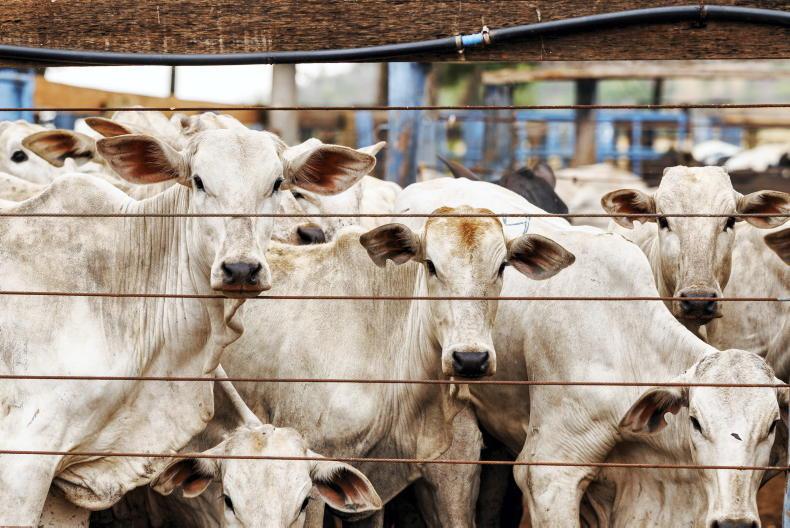Sales of organic produce in Europe almost doubled between 2015 and 2020, according to new analysis by the European Commission.
However, more recent data suggests that this increase has been impacted by inflation, with Germany seeing its first drop in demand since records began.
Germany's market for organic produce had shrunk 4.1% by the end of October last year, according to the German Farmers' Association (DBV).
However, overall, across Europe, the trends are positive for organic farmers.
Growth
The Commission’s ‘Organic farming in the EU - a decade of organic growth’ report found that there were 14.8m hectares of land in organic production across Europe in 2020, up 41% from the area in 2015.
This represents 9.1% of available European agricultural land and nearly 20% of the total organic area in the world.
Permanent grassland makes up the largest component of this land at 42%, followed by green fodder (17%), cereals (16%) and permanent crops, such as fruit, olives and vineyards (11%).
The countries with the largest area farmed organically are France, Spain, Italy and Denmark, which between them accounted for 52% of the total organic area in Europe in 2012 and 59% in 2020.
Demographic
The organic study also found that there are more European young farmers in organic production than there are in conventional farming.
At EU level, around 21% of organic farms in 2020 had a manager aged under 40, while this proportion was only 12% in conventional farms.

The income gap between organic farms run by women and men was lower than the income gap seen on conventional farms, according to the Commission report.
Interestingly, in terms of gender balance, the share of organic farms run by women was lower than the share of conventional farms run by women at EU level (26% versus 32%) in 2020.
However, despite this, the income gap between organic farms run by women and men was lower than the income gap seen on conventional farms.
In 2019, female organic farmers had an income 28% less than their male counterparts, but for conventional production this gap was 43%.
The Commission also found that organic farming is more labour intensive than conventional. To produce the same output value, 4% more labour was needed on organic farms, at EU level in 2020.
Affordability
In a 2022 EU survey included in the Commission report, compared with conventional food, organic food was perceived as less affordable by most respondents.
The countries with the highest percentages of respondents of this view were Greece (98%), Sweden, Estonia and Cyprus (all 97%), and the lowest were Romania (78%), Austria (85%) and France (90%).
However, overall, in 2020, the world market for organic food and drink exceeded €120bn.
The EU ranks second in the world for consumption of organic food, with a share of 37%, of the global market, with the United States the biggest market player at 41%.
Read more
€186m announced for promotion of sustainable EU food
800 EU farmers quit the sector every day between 2010 and 2020
Sales of organic produce in Europe almost doubled between 2015 and 2020, according to new analysis by the European Commission.
However, more recent data suggests that this increase has been impacted by inflation, with Germany seeing its first drop in demand since records began.
Germany's market for organic produce had shrunk 4.1% by the end of October last year, according to the German Farmers' Association (DBV).
However, overall, across Europe, the trends are positive for organic farmers.
Growth
The Commission’s ‘Organic farming in the EU - a decade of organic growth’ report found that there were 14.8m hectares of land in organic production across Europe in 2020, up 41% from the area in 2015.
This represents 9.1% of available European agricultural land and nearly 20% of the total organic area in the world.
Permanent grassland makes up the largest component of this land at 42%, followed by green fodder (17%), cereals (16%) and permanent crops, such as fruit, olives and vineyards (11%).
The countries with the largest area farmed organically are France, Spain, Italy and Denmark, which between them accounted for 52% of the total organic area in Europe in 2012 and 59% in 2020.
Demographic
The organic study also found that there are more European young farmers in organic production than there are in conventional farming.
At EU level, around 21% of organic farms in 2020 had a manager aged under 40, while this proportion was only 12% in conventional farms.

The income gap between organic farms run by women and men was lower than the income gap seen on conventional farms, according to the Commission report.
Interestingly, in terms of gender balance, the share of organic farms run by women was lower than the share of conventional farms run by women at EU level (26% versus 32%) in 2020.
However, despite this, the income gap between organic farms run by women and men was lower than the income gap seen on conventional farms.
In 2019, female organic farmers had an income 28% less than their male counterparts, but for conventional production this gap was 43%.
The Commission also found that organic farming is more labour intensive than conventional. To produce the same output value, 4% more labour was needed on organic farms, at EU level in 2020.
Affordability
In a 2022 EU survey included in the Commission report, compared with conventional food, organic food was perceived as less affordable by most respondents.
The countries with the highest percentages of respondents of this view were Greece (98%), Sweden, Estonia and Cyprus (all 97%), and the lowest were Romania (78%), Austria (85%) and France (90%).
However, overall, in 2020, the world market for organic food and drink exceeded €120bn.
The EU ranks second in the world for consumption of organic food, with a share of 37%, of the global market, with the United States the biggest market player at 41%.
Read more
€186m announced for promotion of sustainable EU food
800 EU farmers quit the sector every day between 2010 and 2020











SHARING OPTIONS